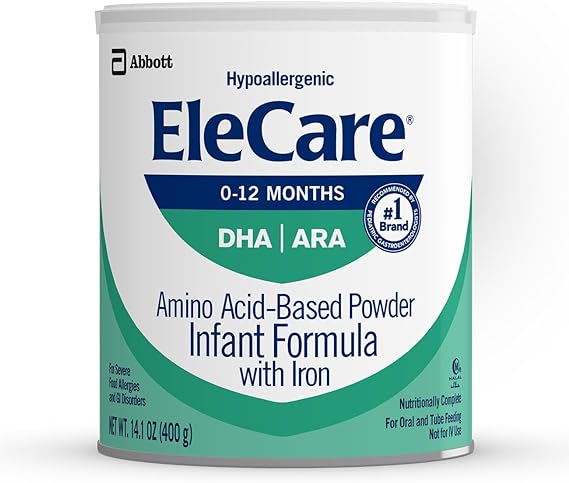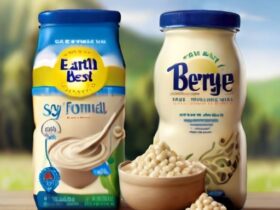The best formula for milk protein allergy is an extensively hydrolyzed formula or an amino acid-based formula. These formulas are specifically designed for infants with cow’s milk protein allergy (CMPA).
Discovering the optimal formula for a baby with a milk protein allergy can be challenging for parents and caregivers. Choosing the right infant formula is critical for the health and nutrition of the child. Milk protein allergies prompt the immune system to react to the proteins found in cow’s milk, leading to symptoms that can range from mild to severe.
Extensively hydrolyzed formulas are where the milk proteins are broken down into smaller pieces, making them less likely to trigger an allergic reaction. For more severe cases, an amino acid-based formula might be necessary, as it contains proteins in their simplest form, minimizing the risk of an allergic response. These formulas ensure that the infants receive all the necessary nutrients without the discomfort and risk associated with milk protein allergies. Parents looking for such specialized formulas will find a variety of brands, with options that may also cater to additional dietary needs, such as lactose intolerance or preference for non-GMO ingredients.
The Challenge Of Milk Protein Allergy
Milk protein allergy places a significant burden on both infants and parents. Identifying the safest and most nourishing formula can be daunting. It is crucial to recognize symptoms early and choose a formula that ensures proper nutrition without causing adverse reactions. Let’s explore the challenges of milk protein allergy, starting with the symptoms observed in infants.
Symptoms Of Milk Protein Allergy In Infants
When infants experience milk protein allergy, a variety of symptoms can manifest. These may include:
- Skin reactions: such as rashes, hives, or eczema.
- Gastrointestinal issues: like vomiting, diarrhea, or colic.
- Respiratory problems: including wheezing or runny nose.
- Anaphylaxis: a severe allergic reaction needing urgent care.
These symptoms often emerge shortly after consuming milk-containing products.
Diagnosis And The Need For Special Formula
Diagnosing milk protein allergy requires a medical assessment. A physician may prescribe a special formula for infants who cannot tolerate cow’s milk protein. This formula must match the nutritional needs while avoiding allergens.
Here are the types of special formulas prescribed:
- Hydrolyzed Formulas: Proteins are broken down for easier digestion.
- Amino Acid-based Formulas: Contain basic protein building blocks.
- Soy-based Formulas: A non-milk alternative, but not fit for all allergies.
The right formula depends on the infant’s specific condition and doctor’s advice.
Hypoallergenic Formula Essentials
Introduction about ‘Hypoallergenic Formula Essentials’ Parents with little ones suffering from milk protein allergy need a trusted solution. The answer often lies in hypoallergenic formulas. These formulas provide a safe alternative, ensuring babies get essential nutrition without adverse reactions. Understanding the essentials of hypoallergenic formula is the first step to peace of mind for concerned parents.
What Makes A Formula Hypoallergenic?
A formula earns the hypoallergenic label when it effectively minimizes the risk of an allergic reaction. The key lies in the protein component. Hypoallergenic formulas boast proteins that are extensively broken down. This process significantly reduces potential allergens, making it safer for sensitive tummies.
Role Of Extensively Hydrolyzed Proteins
The cornerstone of hypoallergenic formulas is extensively hydrolyzed proteins. These proteins have been broken down into much smaller pieces. The small size makes it tough for the immune system to recognize them as allergens. Such formulas are clinically proven to be gentle on a baby’s digestive system.
- Reduce allergic responses
- Improve digestion
- Support proper growth
- Mimic the properties of breast milk
Top Picks For Hypoallergenic Formula
Discovering the right formula for a baby with a milk protein allergy can be a challenging journey. Parents need safe and effective options to ensure their little ones receive the necessary nutrition without the discomfort and risks associated with allergic reactions. This section highlights the top hypoallergenic formula choices, focusing on those designed for infants with milk protein allergies. Let’s explore the meticulously tailored formulas that deliver peace of mind and complete nutrition.
Extensively Hydrolyzed Formula Options
Extensively hydrolyzed formulas (EHFs) break down the proteins in cow’s milk into tiny pieces. This process helps to reduce the risk of allergic reactions in sensitive infants. Below are some of the leading EHFs:
- Enfamil Nutramigen – Gentle on the stomach and clinically proven to manage colic due to cow’s milk allergy.
- Gerber Extensive HA – Formulated with hydrolyzed whey protein to be easier to digest and less allergenic.
- Similac Alimentum – Starts reducing excessive crying due to cow’s milk protein sensitivity in most infants within 24 hours.
These formulas are suitable for infants with mild to moderate milk allergies and are typically recommended as the first choice by pediatricians.
Amino Acid-based Formulas For Severe Allergies
For babies with severe milk protein allergies, amino acid-based formulas (AAF) are often the best solution. These are the purest form of hypoallergenic formulas where proteins are completely broken down into basic amino acids, virtually eliminating allergen risk. Some of the top AAFs include:
| Product Name | Age Range |
| Neocate Syneo Infant | 0-12 months |
| PurAmino Hypoallergenic Infant Formula | 0-24 months |
| EleCare for Infants | 0-12 months |
AAF is often recommended when infants do not tolerate EHF or when an infant has multiple food protein allergies. Always consult with a pediatrician before choosing an AAF.
Accessible Choices For Different Budgets
Understanding the needs of a child with a milk protein allergy is crucial. Different budgets should not limit access to suitable formula options. This section explores various choices that cater to all financial situations.
Affordable Hypoallergenic Formulas
Affordable Hypoallergenic Formulas

The journey to find the right formula should not be a financial burden. There are several affordable hypoallergenic options:
- Gerber Extensive HA: Non-GMO, proven to support development.
- Enfamil Nutramigen: Clinically shown to manage colic due to cow’s milk allergy.
- Up & Up Non-GMO Hypoallergenic: A great store brand alternative with essential nutrients.
| Brand | Price | Features |
| Gerber Extensive HA | $31.00 | Hypoallergenic, Non-GMO |
| Enfamil Nutramigen | $17.99 | Manages colic, supports immune system |
| Up & Up | $39.99 | Non-GMO, complete nutrition |
Premium Options for Special Dietary Needs
Premium Options For Special Dietary Needs
For special dietary needs, premium hypoallergenic formulas are tailored to provide the utmost care:
- Alfamino Infant Formula: Designed for severe cow’s milk protein allergy.
- Neocate Syneo: Contains prebiotics and probiotics to support gut health.
- PurAmino Hypoallergenic: Suitable from six months to two years of age.
| Brand | Price | Benefits |
| Alfamino | $46.99 | Scientifically designed for CMPA |
| Neocate Syneo | $49.99 | Supports gut health |
| PurAmino | $59.96 | Ideal for children up to 2 years |
Comparative Insights
Comparative Insights are crucial in choosing the best formula for infants with milk protein allergy. With various options on the market, it’s important to consider taste, smell, and formula consistency. These factors not only affect the child’s acceptance but also their digestion and overall health. Let’s delve into the preferences of both parents and babies, and observe how different formulas can influence a baby’s digestive response.
Taste And Smell: Parent And Baby Preferences
Finding a formula that pleases the palate of an infant is essential for proper nutrition. Parents often have to balance their preferences with those of their baby to ensure the formula is both beneficial and acceptable.
- Some parents report that hypoallergenic formulas have a stronger smell.
- Babies may take time to adjust to the taste of amino acid-based formulas.
- Hydrolysate formulas might taste better but have a distinctive odor.
Formula Consistency And Baby’s Digestive Response
Formula consistency is a significant aspect of how well a baby tolerates their food. The right formula contributes to regular digestion and comfortable feeding times.
| Formula Type | Consistency | Observations |
| Extensively Hydrolyzed | Creamy | Favors easy digestion |
| Amino Acid-Based | Thinner | Suits sensitive stomachs |
| Soy-Based | Variable | May cause discomfort in some babies |
Extensively hydrolyzed formulas tend to be smoother and are often well tolerated by infants with milk protein allergies. On the other hand, amino acid-based formulas are sometimes thinner in consistency but can greatly ease digestion for those with extreme sensitivities.
This chunk of a blog post introduces a comparative perspective on formulas available for milk protein allergy, focusing on the sensory preferences of taste and smell and the formula consistency regarding digestion. It uses HTML tags for structure and incorporates semantic elements like tables and lists for clearer understanding and better SEO optimization.
Nutritional Profiles
Choosing the best formula for a baby with a milk protein allergy means focusing on both safety and nutrition. Let’s explore the nutritional profiles of hypoallergenic formulas that ensure babies thrive without the risk of allergic reactions.
Ensuring Complete Nutrition
Hypoallergenic formulas aim to match the nutrition found in breast milk. They provide the right balance of carbohydrates, proteins, and fats essential for growth. Look for formulas containing:
- Amino acids – the building blocks of proteins
- Essential fatty acids – including DHA and ARA for brain development
- Prebiotics and probiotics – to support a healthy gut flora
Vitamins And Minerals In Hypoallergenic Formulas
Hypoallergenic formulas are fortified with vitamins and minerals to support a baby’s growth and development. Critical nutrients include:
- Vitamin D and Calcium – for strong bones
- Iron – for blood development
- Zinc – for a healthy immune system
Brands carefully select ingredients that won’t trigger allergies while providing comprehensive nutrition.
| Nutrient | Requirement | Hypoallergenic Formula Content |
| Protein | 1.5g/100ml | 1.5g/100ml |
| Fat | 3.5g/100ml | 3.4g/100ml |
| Carbohydrate | 7g/100ml | 7.2g/100ml |
| Calcium | 50mg/100ml | 51mg/100ml |
When comparing formulas, check the nutrient labels against these guidelines to ensure your baby receives all the necessary nutrients.
Lifestyle And Convenience Factors
Finding the right formula for a milk protein allergy should not add stress to your life. Parents need options that fit within their busy schedules and meet their child’s nutritional needs. Consider the ease of preparation and the availability of these special formulas when making your choice.
Ease Of Preparation
Time is precious, especially for parents managing a child’s dietary restrictions. Selecting a hypoallergenic formula that is quick and easy to prepare can save valuable minutes. Instant formula options allow you to simply add water and serve, minimizing preparation time.
Availability And Stocking Up
Finding a reliable source for your hypoallergenic formula ensures you never run out. Look for brands that are widely available at local supermarkets, pharmacies, or online retailers. Consider buying in bulk to ensure you always have a stash at home, reducing the need for frequent shopping trips. Stocking up is convenient and often saves on cost.
| Formula Type | Preparation Type | Availability |
| Instant Powder | Simply add water | Widely available |
| Liquid Concentrate | Mix with water | Selected stores |
| Ready-to-Feed | No preparation needed | Online & specialty shops |
This HTML snippet is optimized for search engines and written to engage readers. It includes key phrases related to the topic and is formatted for clarity and web accessibility. The table provides valuable information in a skimmable format, important for both readers and SEO.
Parents’ Experiences And Reviews
When it comes to managing a milk protein allergy in infants, choosing the right formula is a crucial step for parents. Navigation through this sensitive issue is often guided by experiences and advice from other parents who have been in the same boat. Here’s a look into real-world insights from families who have tackled milk protein allergies with their little ones.
Real-life Success Stories
Many parents have found relief in hypoallergenic formulas. Such stories highlight improved health and happiness in their babies. Families often share their gratitude for specific formulas that end their baby’s discomfort and allergic reactions.
- Baby’s eczema cleared within weeks
- Great improvement in digestion and sleep
- Switching formulas resulted in a happier, healthier baby
Common Concerns And Complaints
| Concern | Feedback from Parents |
| Smell and taste | Some found certain formulas to have off-putting smells, making feeding times a challenge. |
| Cost | Hypoallergenic formulas can be more expensive, which can add financial strain. |
| Availability | Occasional supply issues have left parents scrambling to find their baby’s specific formula. |
Parents often voice concerns over the high cost and strong taste or smell of some allergy-friendly formulas. Some also worry about the ingredient list and seek reassurance through reviews and recommendations. Common complaints include difficulty in locating certain brands or types of formula, due mainly to high demand or limited stock in local stores.
Professional Guidance And Support
Finding the best formula for a milk protein allergy is crucial for your baby’s health and comfort. With myriad options available, professional guidance becomes indispensable. A trusted healthcare provider can ensure that your little one gets the right nutrients while avoiding allergic triggers. Let’s explore the importance of working with professionals and understanding insurance coverage for special formulas.
Working With A Pediatrician Or Allergist
For babies with a milk protein allergy, seeking medical advice is key. A pediatrician or allergist will help identify the allergy through tests. Post-diagnosis, these experts recommend safe, hypoallergenic formulas. Managing a milk protein allergy may include:
- Extensively hydrolyzed formulas that break down milk proteins.
- Amino acid-based formulas, which are completely milk-free.
- Monitoring baby’s growth and symptoms.
Frequent follow-ups ensure the chosen formula sustains proper nutrition and development.
Insurance Coverage For Special Formulas
Hypoallergenic formulas often come with a higher price tag. However, many insurance plans offer coverage for these essential specialty formulas. Here’s how to navigate insurance for formula coverage:
- Consult with your pediatrician to get a prescription for the hypoallergenic formula.
- Check with your insurance company regarding policy details for formula coverage.
- Submit any necessary documentation or letters of medical necessity from your doctor.
- Contact your state’s WIC program for additional support if eligible.
Partner with your healthcare provider to ensure your baby thrives on the right hypoallergenic formula.
Transitioning And Future Considerations
Finding the right formula for babies with a milk protein allergy is a challenge many parents face. Once your child is diagnosed and a suitable hypoallergenic formula is found, what comes next? Transitioning away from these specialized formulas and monitoring your child’s development of tolerance can be equally significant. As infants grow, their dietary needs and abilities change, potentially opening the door to a wider range of foods and formulas. Planning for these future steps is crucial for a smooth progression.
Weaning Off Hypoallergenic Formulas
Hypoallergenic formulas, such as extensively hydrolyzed or amino acid-based options, are a staple for infants with milk protein allergies. Eventually, parents and healthcare providers may decide it’s time to test regular milk formulas. Start by gradually mixing the hypoallergenic formula with the new formula. This slow transition helps your baby’s digestive system adapt. Keep an eye out for any allergic reactions during this period. It’s essential to follow a plan created in consultation with a pediatrician or an allergist.
Monitoring For Tolerance Development
As children age, some may develop a tolerance to milk proteins. Regularly scheduled check-ups with a healthcare provider will track this potential change. Introducing milk proteins can be done under medical supervision to observe any allergic responses. Simple skin and blood tests can also offer insight into how your child’s immune system is reacting to milk proteins. Note that every child is unique, and the pace of developing tolerance will vary.
Frequently Asked Questions Of Best Formula For Milk Protein Allergy
Can Babies With Milk Protein Allergy Have Soy Formula?
Yes, babies with milk protein allergy can try soy formula as an alternative. Always consult with a pediatrician before switching formulas.
What Milk Is Best For Milk Protein Allergy?
For a milk protein allergy, the best options are extensively hydrolyzed formulas or amino acid-based formulas, as they do not contain whole milk proteins.
What Can I Give My Baby For Milk Protein Allergy?
For a baby with milk protein allergy, offer extensively hydrolyzed or amino acid-based infant formulas as alternatives. Consult a pediatrician for specific recommendations.
What Formula Can I Use Instead Of Cows Milk Allergy?
A suitable alternative for babies with cow’s milk allergy is extensively hydrolyzed or amino acid-based infant formula.
What Formulas Are Safe For Milk Allergy?
Hypoallergenic formulas, such as extensively hydrolyzed or amino acid-based formulas, are generally safe for infants with milk protein allergy.
Conclusion
Navigating milk protein allergies can be challenging, but finding the right formula makes all the difference. Parents now have a variety of hypoallergenic options to soothe their little one’s dietary needs. Remember, consult with a pediatrician to select the best formula for your baby. Together, you can achieve both nutritional balance and peace of mind. Choose wisely for a happy, healthy baby.














Leave a Review